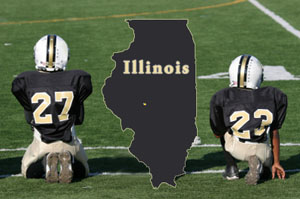CHICAGO — Illinois might seem the least likely place for the health law to get sidelined. It’s a state with a Democratic governor and solid Democratic majorities in both houses of the legislature. It’s also the political base of President Barack Obama, who championed the legislation in the face of furious opposition.

Yet even here, voters are divided on the law’s merits, and a bill authorizing creation of a state-based health insurance exchange — a centerpiece of the law designed to expand coverage to millions of people — has been stalled while state lawmakers wait to see how the Supreme Court rules.
“Our reaction to the Affordable Care Act was one of great pride that the president was able to pass something,” said Michael Gelder, senior health policy adviser to Gov. Patrick Quinn. “Yet we still are struggling with most of the states to get this legislation passed.”
With the legislative session recently ended, some speculate Quinn will act unilaterally to set up the exchange by issuing an executive order — the approach taken by governors in New York and Rhode Island. Quinn’s office did not respond to requests for comment.
Creating the exchanges has been “a hard sell” in many states, even those that appear politically receptive, said Thomas Miller, a resident fellow at the American Enterprise Institute. “They have a lot of trouble actually getting to . . . completion.”
Seventeen states have put implementation on hold until the court’s decision, expected this month, according to the Center on Budget and Policy Priorities. An additional 13, plus the District of Columbia, have authorized their creation. Many of the others, including Illinois, have legislation pending.
The exchanges are supposed to function as online marketplaces where consumers can compare health plans and determine their eligibility for programs such as Medicaid or subsidies to help buy coverage. States must submit their blueprints by Nov. 16 and get conditional approval for their plans no later than January 2013 to begin enrolling residents 10 months later. If states are deemed unable or unwilling to act, the federal government must offer a federally sponsored exchange.
Rep. Greg Harris, a Chicago Democrat in the state’s General Assembly, said the tone of the justices’ questions during the court’s arguments in March “did not bode well for the individual mandate,” which many believe is a prerequisite for attracting enough healthy people to the exchanges to enable the plan to function well.
The uncertainty has led to “hesitancy by a lot of the players,” Harris said. “Will it be a narrow decision or will it be a broader decision? Before you write something into law that is going to be so sweeping, you like a little predictability.”
Illinois officials estimate nearly 800,000 uninsured residents would get public or private health insurance through the exchange in 2014, climbing to more than 1 million by 2020.
Although state agencies can do most of the planning, they need legal authority from their state legislatures to authorize the setup. “It’s a great incentive for procrastination and delay,” Miller said. “Despite periodic attempts by Health and Human Services to say, ‘Here’s what it might look like,’ or ‘Try this version,’ states simply grunt at them.”
That’s as true in Illinois as elsewhere; 45 percent of the state’s voters support the law and 45 percent oppose it, according to a Chicago Tribune/WGN poll in February, “Our elected officials are keen on not deciding something that can be decided for them,” Gelder said.
The policy of no cooperation by the national Republican leadership, which local Republican officials have endorsed, has also made it harder to move ahead because some Democrats are reluctant to take a party-line vote on a controversial issue.
“Democrats may be wary of making unpopular votes with some of their constituents, only to have Obamacare struck down by the Supreme Court,” said Michael Lawrence, a decades-long observer of Illinois politics and press secretary to former Gov. Jim Edgar, a Republican.
“Neither side wants to take the political risk,” said John Bouman, president of the Sargent Shriver National Center on Poverty Law in Chicago, an advocacy group for low-income people. “Republicans don’t want to put any votes on it,” and Democratic leaders of the Assembly and Senate didn’t want the vote to go down as a partisan split, so they put the bill aside for the time being, he said.
It’s not as if state officials don’t have plenty on their plate trying to resolve the state’s parlous fiscal condition, including billions in unpaid Medicaid bills and unfunded public pension liabilities. The exchange bill doesn’t rise to the same level of necessity, Lawrence said.
“I don’t have the sense that this issue of establishing a health-care exchange is going to be big on the radar screen when Illinoisans go to the polls in November,” he said. On the other hand, “the situation could look different if the Supreme Court upholds Obamacare.”
In recognition of the political and technical challenges confronting many states, the Department of Health and Human Services recently offered some new options. In addition to the tailor-made state exchange or a one-size-fits-all federal exchange, there is now a third option: a “state partnership exchange” with the federal government, where HHS would assume activities the state was unable to handle.
“They’re going to be happy in the White House if they have a dozen states that can limp to the starting line,” Miller said.